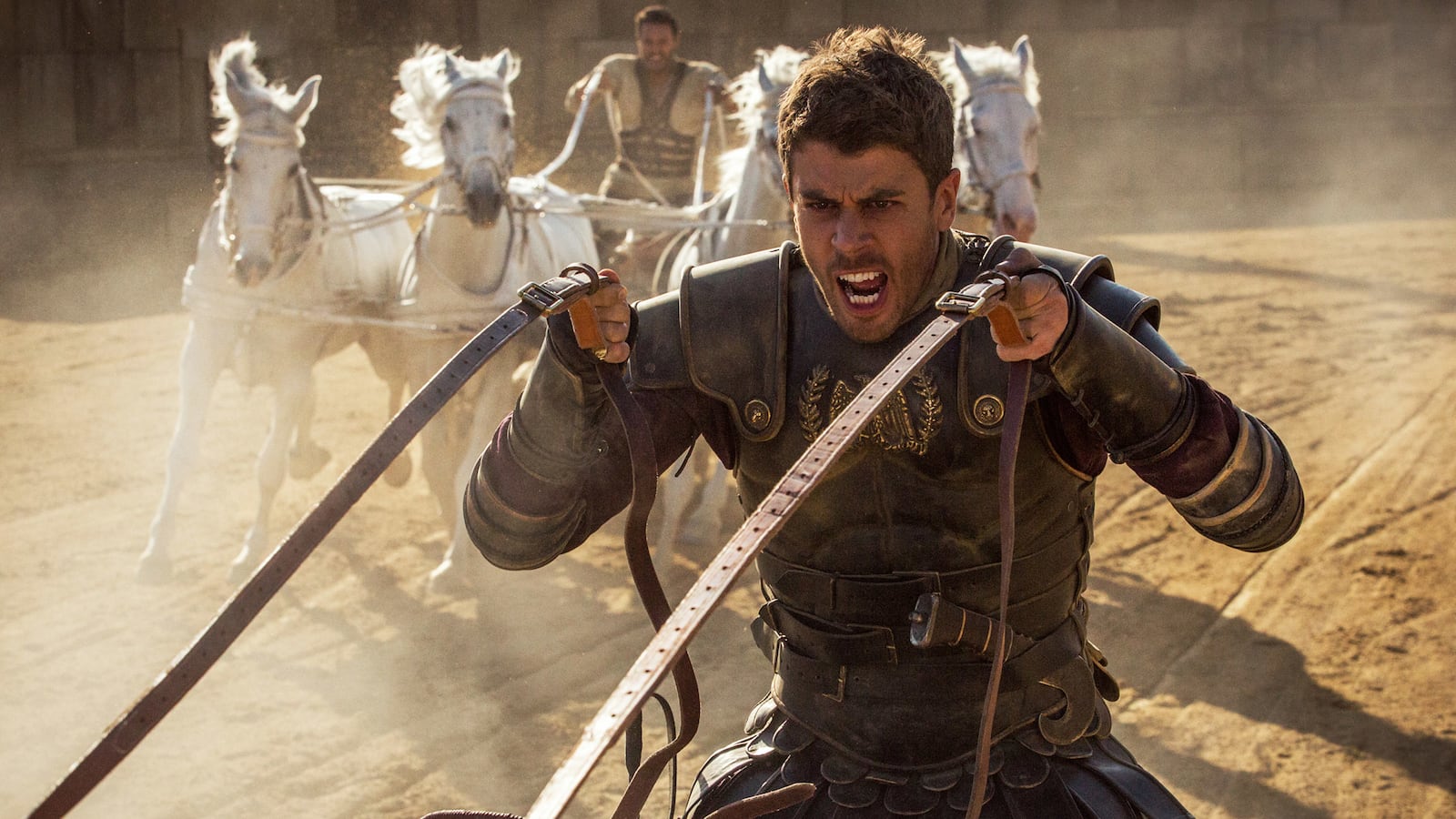“They are all Romans now,” proclaims Pontius Pilate, prefect of Judea, as he watches throngs of Jews exult over the chariot victory of their champion, Judah Ben-Hur. The line speaks to one element (among many) that the new Ben-Hur so utterly lacks: any insight into the meaning of Roman identity and power in a culturally diverse world. For a country with long-term military commitments in the Middle East, in landscapes very much like the sets of this hollow remake, that lack is deeply troubling.
Ancient Rome has often served Hollywood studios as a stand-in for America in its role as world hegemon, as well as for the militaristic regimes that threaten American freedom. That dual legacy was a central theme of the Coen brothers’ film-within-a-film, Hail Caesar!, released earlier this year. In part a spoof of the 1959 Ben-Hur, this savvy comedy set the story of a Roman soldier in Jerusalem against the backdrop of the Cold War. George Clooney, playing an officer of the Roman army of occupation, simultaneously converts (in the interior film) to the worship of Christ and (in the exterior film) to the utopian Communist vision preached by a cadre of pro-Russian screenwriters, while also contemplating a job with an aerospace firm developing new nuclear weapons.
Hail, Caesar! took as its premise the idea that no Hollywood portrayal of ancient Rome exists in a political vacuum. Global hegemony is a rare enough phenomenon, historically, that the Roman Empire inevitably becomes a mirror for American power in the post-World War II world, albeit a distorting one. And when that Empire goes toe to toe with Middle Eastern religious fanatics, as in the Ben-Hur story, the parallels become inescapable, and profoundly disquieting.
The new Ben-Hur seems to highlight these parallels with an important change to the plot of the previous versions (three American films, going back to 1907, and the 1880 novel on which they were based). The incident that sets Judah Ben-Hur, Judaean prince, against his childhood friend Messala, Roman officer, is, in these earlier Ben-Hurs, a piece of fantastically bad luck. While the Hur family watches from their roof a Roman military procession through Jerusalem, a tile slides from a parapet and falls to the street below. Judah and his family are blamed for the affront, however accidental, to Roman authority.

The 2016 Ben-Hur reimagines this incident as an attack mounted by a young Zealot, a Jewish guerrilla fighting the Roman occupation, whom Judah had, for humanitarian reasons, sheltered in his home. This wild-eyed boy fires a single arrow at Pontius Pilate as he passes in the procession, narrowly missing him but killing another soldier. The episode clearly evokes modern insurgent tactics—the sniper fire and IED’s to which Western troop convoys are exposed, as they pass through the streets of Fallujah and Ramadi—leaving an American moviegoer somewhat puzzled as to which side in this ancient struggle he or she is on. Judah, for his part, is infuriated by the attack but implicitly condones it by helping the Zealot escape.
Other episodes of the new Ben-Hur, as well as of Risen, another (and considerably better) Rome-in-the-Mideast movie that had a brief run in theaters this February, strongly evoke the role that American troops have had to play in the past 15 years. In both films, Roman officers are seen interrogating suspected guerillas, recruiting informers, and (in the case of Risen at least) going undercover to gain information. The religious opposition to their army of occupation is, of course, Jewish and/or Christian, not Muslim, but one form of fanatical monotheism, from the perspective of the Romans at least, must have looked much like another.
“You’re either with me or against me,” says Messala to Judah Ben-Hur in the 1959 film, but this new version seems to want to have things both ways. Whereas the death of Messala in the earlier film emblematized the triumph of Judeo-Christian freedom over Roman imperial domination, Messala is strangely rehabilitated in the remake and—a spoiler alert would be appropriate here, were the film able to evoke any real emotion or engagement—rejoins the Hur family as a convert to … what exactly? The merry band goes off to some vague utopian destiny, but whether Messala is still Roman, or (as his counterpart Clavius was in Risen) a new apostle of Christianity, remains unclear. Somehow the force of universal love is made capable of uniting two mutually hostile world systems.
In another new element in this version, a montage of Messala’s career as a soldier in Rome’s frontier wars, a voiceover speaks vaguely of the goal for which both Judah and Messala are fighting—“a civilized world.” It’s perhaps the lowest common denominator shared between two cultures that seem otherwise to be on a collision course. To a moviegoer attuned to recent American confrontations with religious zealotry in the Mideast, the 2016 Ben-Hur suggests, like Risen did before it, a total absence of conviction as to how that goal can be achieved.






